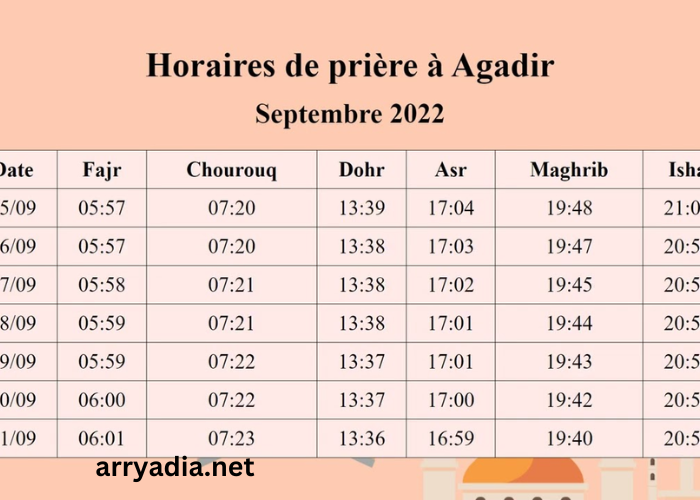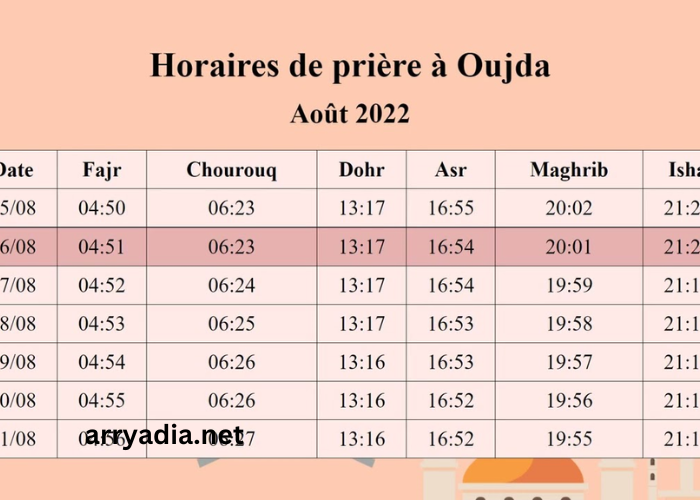Agadir, a beautiful coastal city in Morocco, is known not just for its stunning beaches and rich culture but also for its devout Muslim community. Prayer is an integral part of everyday life for Muslims, and knowing the accurate prayer times is essential. This article will provide a detailed guide on the prayer times in Agadir for the year 2022, ensuring you never miss your daily prayers.
Importance of Prayer in Islam
Prayer, or Salat, is one of the Five Pillars of Islam, which are the foundation of a Muslim’s faith and practice. It serves as a direct link between the worshipper and Allah (God). Muslims are required to pray five times a day: Fajr (before dawn), Dhuhr (midday), Asr (afternoon), Maghrib (just after sunset), and Isha (night). Each of these prayers has its specific time based on the position of the sun. Regular prayer helps Muslims maintain a sense of discipline and spiritual well-being, connecting them with their faith and community.
Why Knowing Prayer Times is Essential
Accurate prayer times are crucial because each of the five daily prayers must be performed within a specific time frame. Missing a prayer time is considered a significant lapse, and while Islam provides opportunities to make up missed prayers, it’s always preferable to observe them on time. Having access to a reliable timetable helps Muslims fulfill their religious obligations correctly, especially in a city like Agadir, where changes in weather and daylight can affect the prayer times.
How Prayer Times are Determined
Prayer times are determined by the position of the sun. Here’s a brief overview of how each time is calculated:
- Fajr (Dawn Prayer): This prayer begins just before dawn, marking the first light of the day. It ends at sunrise.
- Dhuhr (Midday Prayer): This prayer starts when the sun has passed its zenith and begins to decline. It’s usually around noon but varies with the seasons.
- Asr (Afternoon Prayer): This prayer time starts in the afternoon when the shadow of an object is equal to its height. It ends just before sunset.
- Maghrib (Evening Prayer): Maghrib prayer time begins immediately after sunset and continues until the twilight disappears.
- Isha (Night Prayer): Isha begins when the twilight has completely disappeared and lasts until midnight or before dawn.
Prayer Times in Agadir for 2022
In Agadir, the prayer times will vary slightly each day due to the changing position of the sun throughout the year. However, a general guide to the prayer times for different months in 2022 is as follows:
- January:
- Fajr: Around 6:30 AM
- Dhuhr: Around 12:40 PM
- Asr: Around 3:40 PM
- Maghrib: Around 6:00 PM
- Isha: Around 7:20 PM
- April:
- Fajr: Around 5:15 AM
- Dhuhr: Around 12:35 PM
- Asr: Around 4:00 PM
- Maghrib: Around 7:05 PM
- Isha: Around 8:30 PM
- July:
- Fajr: Around 4:45 AM
- Dhuhr: Around 1:35 PM
- Asr: Around 5:10 PM
- Maghrib: Around 8:25 PM
- Isha: Around 9:45 PM
- October:
- Fajr: Around 5:55 AM
- Dhuhr: Around 12:40 PM
- Asr: Around 4:00 PM
- Maghrib: Around 6:45 PM
- Isha: Around 8:00 PM
These times are estimates and can vary slightly due to various factors such as geographical location and the method of calculation. Many Muslims in Agadir rely on local mosques, mobile apps, or Islamic websites to provide accurate daily prayer times.
Best Ways to Stay Updated with Prayer Times
Staying updated with prayer times is crucial for every practicing Muslim. Here are some reliable ways to keep track of prayer times in Agadir:
- Prayer Time Apps: Numerous Islamic apps are available on smartphones that provide accurate and daily updated prayer times. Apps like Muslim Pro, Athan, and Salaat First are popular choices, offering features like Qibla direction, Islamic calendar, and audio notifications for prayer times.
- Local Mosques: Many mosques in Agadir display daily prayer times on digital boards. Attending prayers at the mosque also ensures you’re always praying at the correct time.
- Islamic Websites: Websites such as Islamic Finder and other local Islamic community websites offer prayer times specifically for Agadir. These websites are regularly updated to reflect accurate times.
- Printed Timetables: Some Islamic centers or community organizations provide printed timetables that can be kept at home or work for quick reference.
Factors Influencing Prayer Times
Several factors can influence the accuracy of prayer times. It’s essential to understand these factors to adjust accordingly:
- Geographical Location: Agadir’s latitude and longitude affect the calculation of prayer times. The closer you are to the equator, the less variation there is in the length of day and night.
- Daylight Saving Time (DST): Although Morocco typically observes DST, prayer times are adjusted to account for the one-hour change in the clock.
- Method of Calculation: Different Islamic schools of thought may use slightly different methods for calculating prayer times. It’s advisable to follow the method most accepted by your local community or religious authority.
Tips for Consistently Observing Prayer Times
Maintaining a consistent prayer schedule can be challenging, especially with the busy lifestyle that many people lead. Here are some practical tips to help you keep up with your prayers:
- Set Alarms: Using alarms on your phone or a prayer time app can help remind you of the prayer times. Make it a habit to set alarms for each prayer.
- Create a Prayer Space: Designate a quiet, clean, and comfortable space in your home or office where you can perform your prayers without distraction.
- Join a Prayer Group: Participating in a community prayer group can provide encouragement and accountability. It also allows you to learn more about the prayers and their significance.
- Plan Your Day Around Prayer Times: Try to schedule your daily activities around prayer times. This might mean taking a short break during work or organizing social events after prayers.
Benefits of Regular Prayer
Performing prayers regularly has numerous spiritual, psychological, and physical benefits. Here are a few:
- Spiritual Connection: Regular prayer fosters a deeper connection with Allah, offering a moment of reflection and guidance.
- Stress Relief: The structured practice of taking time out of one’s day to pray can significantly reduce stress and provide mental clarity.
- Physical Exercise: The movements involved in prayer, such as bowing and prostration, can improve flexibility and circulation.
- Discipline and Time Management: Observing prayer times encourages a disciplined lifestyle and effective time management skills.
Conclusion
Prayer is a cornerstone of the Islamic faith, offering spiritual nourishment and a sense of peace and community. For Muslims living in or visiting Agadir, staying informed about the accurate prayer times in 2022 is essential. By using modern tools like prayer apps, consulting local mosques, and understanding the factors that affect prayer times, you can ensure that you fulfill your religious duties effectively.
Regular prayer not only brings one closer to Allah but also provides numerous benefits that enhance the quality of life. May this guide help you stay consistent with your prayers and deepen your spiritual practice throughout the year.


